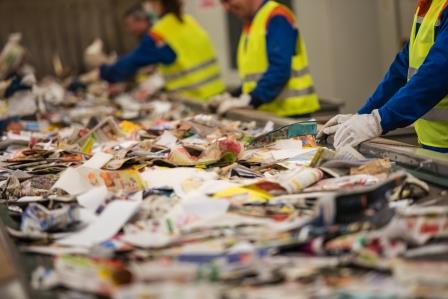
Local government is scrambling to avoid a “recycling crisis” as China clamps down on accepting foreign waste, which threatens to derail councils’ collection of kerbside recycling, a parliamentary inquiry has been told.
Peak bodies representing local councils and the waste management industry have said a clear vision and national action plan for how Australia manages waste and resource recovery is now urgently needed.
Since January, China has introduced more stringent standards on imported waste and recycled materials under its National Sword policy, blocking many Australian materials and causing severe waste management problems for some councils.
At the Senate Environment and Communications References Committee inquiry into the waste and recycling industry last week Local Government NSW president Linda Scott said some councils were being asked to renegotiate contracts so processors can recoup the increased cost of processing recycling material onshore.
“If the recycling industry in Australia falters then we all lose,” she told the inquiry on Wednesday.
Echoing others from the waste and recycling industry, Cr Scott said that with state and federal government support Australia could develop new regional jobs in a home-grown environmental and recycling industry.
While councils are already seeking support to develop markets for recycled glass, paper and plastics and working to reduce recycling contamination levels, there is an immediate need for financial assistance and fast-tracking of approvals for on-shore reprocessing and remanufacturing, Cr Scott said.
“There is also an immediate need for market development such as requiring recycled content in certain products: glass sand for pipe bedding, road base and asphalt, for example,” she told the inquiry.
Australia needs national approach
Gayle Sloan, CEO of the Waste Management Association of Australia, told the inquiry that a clear vision for how Australia manages waste and resource recovery, and a consistent policy approach across states, was needed for industry to be effective.
The growing crisis brought about by China’s national policy only highlighted long-standing issues with waste and recycling policy in Australia, she said. It also represented an opportunity to tackle regulatory settings at state and national level to support the sector’s growth and create jobs and investment, she said.
The lack of a unified vision for the sector led to “well publicised perverse outcomes” such as the transport of waste across borders, which included construction and development waste between NSW and Queensland and medical waste from Western Australia to Victoria, Ms Sloan told the inquiry.
“We have the situation where beverage containers can be redeemed in Albury but not Wagga, where energy for waste facilities are commencing in Western Australia and nothing approved as yet in NSW.”
Australia has been left behind the world rest of developed world in transitioning to a “circular economy” and using waste commodities as a resource, she said.
Roundtable hears solutions
Elsewhere, Federal Government bureaucrats who attended a workshop in Canberra on Thursday were told that the issues facing the recycling industry needed a national response.
The meeting – attended by local, state and federal government officials and banking and waste, recycling and packaging peak bodies – heard that China’s restrictions likely affect 40 material recycling facilities and eight companies in Australia.
But given the small number of operators in the industry, any collapses would significantly impact the future of recycling in Australia, delegates in attendance said.
“Participants thought that the Federal Government was best placed to focus on medium and long-term goals,” the Australian Local Government Association reported after the workshop.
Some of the ideas put forward included greater industry certainty to encourage investment, initiatives to encourage recycling and selection of more sustainable products, and diversification for products and markets.
Government actions
At the senate inquiry’s previous hearing in November the National Waste and Recycling Industry Council said it supported calls for the Federal Government to look at uniform conditions and standards across states.
“We’ve asked for a national audit of stockpiles, which is the jurisdiction of the Commonwealth Government,” the council’s CEO Max Spedding told that hearing.
Visy Recycling has said government should support domestic recyclers that utilise kerbside recycling materials for re-manufacturing activities, and it should create domestic markets through mandating recyclable material usage as raw material or feedstock, which could be reflected in government procurement
“An example would be mandating recyclable glass aggregate into public roadbuilding, and plastics into public infrastructure and locally manufactured paving materials,” Visy’s Tony Monaco told the November hearing.
“On government policy, local government kerbside tenders must consider and prioritise factors that enhance jobs, economic benefits from recyclables used domestically, and re-manufacturing, ahead of simply price.”
The inquiry’s hearings continue. It is due to report on 13 June.

Federal Government needs to take action rather than leave individual councils to flounder in a growing sea of waste… Federal Government could finance the building of specialist recycling plants in small rural communities to shore up the economies in those towns in times of drought. The plants could then be leased back to the councils, or to small operators or sold outright to larger consortiums who are specialists in the field of recycling. The whole idea is to ‘kill two birds with one stone’, create jobs and ease the burden on Centrelink, while at the same time solving our ever-mounting recycling crisis … we really need politicians representing us who don’t have ‘tunnel vision’ and can see beyond the square and a situation which is ‘dead in the water’. The old mindsets need to go. We have a national crisis on our hands and it requires a national solution.